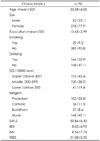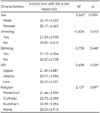Abstract
Objectives
In order to improve the life satisfaction, we should be aware of psychological factors associated the life satisfaction. Therefore, the purpose of this study was to examine the effect of depression, anxiety, temperament, and character on life satisfaction in college students.
Methods
A total 314 participants completed questionnaires, which included Satisfaction with Life Scale, Beck Depression Inventory-II, Beck Anxiety Inventory, The Rosenberg Self-Esteem Scale and Temperament and Character Inventory-Revised. To evaluate the difference according to social factor, t-test and one-way analysis of variance were performed. To analyze the effect of psychological characteristics on life satisfaction, stepwise multiple regression analysis was used.
Results
Life satisfaction was significantly different according to only gender of the social factors. Life satisfaction was positively correlated with self-esteem, self-directedness, and persistence (P). Conversely, depression, anxiety, harm avoidance, and novelty seeking (NS) were negatively correlated. Stepwise multiple regression revealed that depression, self-esteem, P, NS, and self-transcendence were factors affecting life satisfaction in university students.
Conclusion
This result shows that life satisfaction is influenced by depression, self-esteem, temperament, and character. The findings of this study suggest that to improve the life satisfaction requires not only preventing and treatment of depression but also identifying the psychological characteristics, such as temperament and character.
Figures and Tables
Table 3
Correlations of TCI, BDI, BAI, RSES scores with satisfaction with life scale

Pearson correlation analysis. *: p≤0.05, **: p≤0.01. BDI : Beck Depression Inventory, BAI : Beck Anxiety Inventory, RSES : The Rosenberg Self-Esteem Scale, SWLS : Satisfaction with Life Scale, HA : Harm avoidance, NS : Novelty seeking, RD : Reward dependence, P : Persistence, SD : Self-directedness, C : Cooperativeness, ST : Self-transcendence, TCI : The Temperament and Character Inventory
References
1. Rosenbaum P, Stewart D. The World Health Organization International Classification of Functioning, Disability, and Health: a model to guide clinical thinking, practice and research in the field of cerebral palsy. Semin Pediatr Neurol. 2004. 11:5–10.

2. Diener E, Oishi S, Lucas RE. Personality, culture, and subjective well-being: emotional and cognitive evaluations of life. Annu Rev Psychol. 2003. 54:403–425.

4. Pavot W, Diener E. The subjective evaluation of well-being in adulthood: findings and implications. Ageing Int. 2004. 29:113–135.

5. Fujita F, Diener E. Life satisfaction set point: stability and change. J Pers Soc Psychol. 2005. 88:158–164.

7. Ritsner M, Farkas H, Gibel A. Satisfaction with quality of life varies with temperament types of patients with schizophrenia. J Nerv Ment Dis. 2003. 191:668–674.

8. Guillem F, Bicu M, Semkovska M, Debruille JB. The dimensional symptom structure of schizophrenia and its association with temperament and character. Schizophr Res. 2002. 56:137–147.

9. Fogle L, Huebner ES, Laughlin JE. The relationship between temperament and life satisfaction in early adolescence: cognitive and behavioral mediation models. J Happiness Stud. 2002. 3:373–392.
10. Arnett JJ. Learning to stand alone: the contemporary American transition to adulthood in cultural and historical context. Hum Dev. 1998. 41:295–315.

11. Stewart AL, Greenfield S, Hays RD, Wells K, Rogers WH, Berry SD, et al. Functional status and well-being of patients with chronic conditions. Results from the Medical Outcomes Study. JAMA. 1989. 262:907–913.

12. Dickens CM, McGowan L, Percival C, Tomenson B, Cotter L, Heagerty A, et al. Contribution of depression and anxiety to impaired health-related quality of life following first myocardial infarction. Br J Psychiatry. 2006. 189:367–372.

13. Mullen SP, Gothe NP, McAuley E. Evaluation of the Factor Structure of the Rosenberg Self-Esteem Scale in Older Adults. Pers Individ Dif. 2013. 54:153–157.

14. Schimmack U, Diener E. Predictive validity of explicit and implicit self-esteem for subjective well-being. J Res Personal. 2003. 37:100–106.

15. Cloninger CR. Feeling good: the science of well-being. 2004. USA: Oxford University Press.
16. Hong Y, Yi G, Park H. A structural model for health promotion and life satisfaction of life in college students in Korea. J Korean Community Nurs. 2000. 11:333–346.
17. Min BB, Oh HS, Lee JY. Manual of temperament and character inventory. 2007. Seoul, Korea: Maumsarang;15–44.
18. Sung H, Kim J, Park Y, Bai D, Lee S, Ahn H. A study on the reliability and the validity of Korean version of the beck depression inventory-II (BDI-II). J Korean Soc Biol Ther Psychiatry. 2008. 14:201–212.
19. Kwon S. Assessment of psychopathology in anxiety disorder. Korean J Psychopathol. 1997. 6:37–51.
20. Lee YH. The Relations between attributional style, life events, event attribution, hopelessness and depression [dissertation]. 1993. Seoul: Seoul Univ..
21. Park SY. Self-construal and subjective well-being: With a focus on male and female college students in two regions. Korean J Youth Stud. 2005. 12:71–92.
22. Huebner ES. Preliminary development and validation of a multidimensional life satisfaction scale for children. Psychol Assess. 1994. 6:149–158.

23. Carnelley KB, Pietromonacó PR, Jaffe K. Depression, working models of others, and relationship functioning. J Pers Soc Psychol. 1994. 66:127–140.

24. Siddall J, Huebner ES, Jiang X. A prospective study of differential sources of school-related social support and adolescent global life satisfaction. Am J Orthopsychiatry. 2013. 83:107–114.

25. Papakostas GI, Petersen T, Mahal Y, Mischoulon D, Nierenberg AA, Fava M. Quality of life assessments in major depressive disorder: a review of the literature. Gen Hosp Psychiatry. 2004. 26:13–17.

26. Yamaguchi N, Poudel KC, Jimba M. Health-related quality of life, depression, and self-esteem in adolescents with leprosy-affected parents: results of a cross-sectional study in Nepal. BMC Public Health. 2013. 13:22.

27. Cloninger CR, Svrakic DM, Przybeck TR. A psychobiological model of temperament and character. Arch Gen Psychiatry. 1993. 50:975–990.

28. Garcia D, Archer T, Moradi S, Andersson-Arntén AC. Exercise Frequency, High activation positive affect, and psychological well-being: beyond age, gender, and occupation. Psychology. 2012. 3:328–336.

29. McCullough G, Huebner ES, Laughlin JE. Life events, self-concept, and adolescents' positive subjective well-being. Psychol Sch. 2000. 37:281–290.

30. Adams GA, King LA, King DW. Relationships of job and family involvement, family social support, and work-family conflict with job and life satisfaction. J Appl Psychol. 1996. 81:411–420.

31. Margetić BA, Jakovljević M, Ivanec D, Margetić B. Temperament, character, and quality of life in patients with schizophrenia and their first-degree relatives. Compr Psychiatry. 2011. 52:425–430.

32. Garcia D, Kerekes N, Andersson Arntén AC, Archer T. Temperament, character, and adolescents' depressive symptoms: focusing on affect. Depress Res Treat. 2012. 2012:925372.

33. Gusnard DA, Ollinger JM, Shulman GL, Cloninger CR, Price JL, Van Essen DC, et al. Persistence and brain circuitry. Proc Natl Acad Sci U S A. 2003. 100:3479–3484.

34. Cloninger CR. The science of well-being: an integrated approach to mental health and its disorders. World Psychiatry. 2006. 5:71–76.




 PDF
PDF ePub
ePub Citation
Citation Print
Print





 XML Download
XML Download